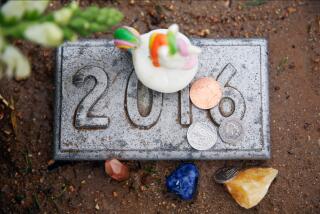New Study of Stress After Spouse’s Death
- Share via
While it has been recognized for some time that recently widowed men and women experience a heightened death rate in the months after their spouses die, a new Finnish study finds the greatest hike in mortality comes in the first seven days--a greater, earlier concentration than had been identified before.
The study focuses new urgency on the problems of coping with the immediate aftereffects of losing a husband or wife. Moreover, it concludes that the most common cause of death during the critical post-death week is heart attack--possibly brought on by the stress of the spouse’s death and exacerbated by an inability to sleep in the first days of grief.
The study, which examined mortality patterns among more than 95,000 Finns, appears to underscore the importance of keeping watch over the health of newly widowed people--with special attention to the first signs of a heart attack, especially in the crucial seven days. The study was conducted at the University of Helsinki. It tracked mortality among widowed men and women for five years and found that among men, 44% of subjects who died succumbed in the first seven days after the death of the loved one; among women who died, it was 49.2%.
The findings were published in the American Journal of Public Health.
The researchers, who also found heightened death rates during the first month and six months after the death, speculated that the heart attack death rate increase, in particular, may be because of grief and emotional distress that bring about sleep disturbances and may result in rhythm variations that lead to heart seizures. They also noted that increased stress after a loved one’s death may lower the body’s resistance to infection and that guilt feelings can lead to depression and such symptoms of self-neglect as missing meals.
Ovulation Kits
One of the newest developments in do-it-yourself medicine--urine test kits for women concerned with knowing when they have ovulated as part of an attempt to become pregnant--passes muster as more accurate than older laboratory-based tests, a new study at USC has reported.
Significantly, though, of two major brands of such in-home ovulation tests, one--Ovustick, manufactured by Mountain View-based Monoclonal Antibodies Inc.--is significantly more accurate than its major competitor, First Response, made by Tambrands Inc., of Palmer, Mass., the USC team found. The findings were published in the journal Fertility and Sterility.
The USC researchers concluded that while the most accurate means of all for determining details of ovulation is ultrasound monitoring that can only be done in a doctor’s office or hospital, the newly developed do-it-yourself tests are significantly better than two traditional means of determining when ovulation has occurred. The two established tests involved basal temperature measurement and a hormone blood test to measure hormone levels.
Of the two new entries in the in-home testing market, Ovustick recorded significantly better accuracy in a comparison of methods used by 11 research subjects. Ovustick was accurate 87.5% of the time, while First Response recorded a 53.3% rate. The researchers concluded that ultrasound is an “excellent” method for detecting ovulation and that Ovustick is “very useful.”
Heimlich Confusion
The American Medical Assn. has joined the American Red Cross and American Heart Assn. in revising guidelines for emergency first aid for choking victims--abandoning recommendations to give a victim four slaps on the back before attempting the Heimlich Maneuver.
But the change--adopted recently by the AMA’s policy-making House of Delegates--wasn’t enough to satisfy Dr. Henry Heimlich, originator of the maneuver and a longtime critic of now discredited guidelines. In a simmering though little publicized dispute, Heimlich has complained that though the AMA has endorsed the new policy, the association has refused to join in what would amount to a product recall of the flawed, earlier backslap advice.
Heimlich’s current concern, he said in a telephone interview from his Cincinnati headquarters, is that materials distributed or endorsed by the AMA, the Red Cross and the Heart Assn. should be recalled so now outdated information does not cause unnecessary deaths. “What you have is a cover-up,” Heimlich charged.
In Chicago, the AMA’s Dr. Alan Engelberg said a new AMA first-aid guide to be published in the next few months will include the revised choking rescue procedure. “I don’t see any dispute here, really,” he said.






